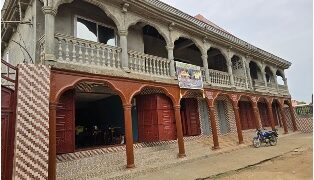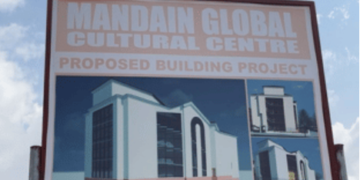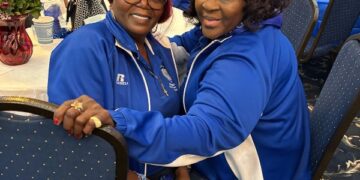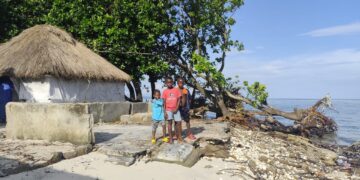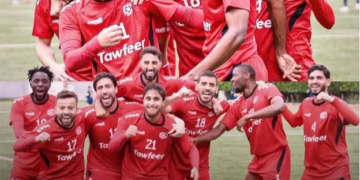By Alpha Amadu Jalloh
Mr. President, it has been said that the closer one gets to power, the more selective the lens through which reality is seen. However, as ordinary citizens of our beloved Sierra Leone, we continue to witness events that shake our confidence in the very institutions meant to safeguard our future. We are told to believe in the rule of law, to trust in the fair and balanced application of justice, and to remain hopeful that our government is working tirelessly for our collective good. Yet, day after day, evidence piles up pointing in the opposite direction: favoritism, secrecy, and a lack of accountability. So, with humility and a heartfelt desire for genuine dialogue, I come again, this time with deeper concerns than ever before. Can We Talk, Mr. President?
Mr. President, rumour has become something of a currency in Sierra Leone, often fueled by the hush-hush nature of many official dealings. This time, though, we find ourselves face-to-face with an allegation that goes beyond mere whispers. How is it possible, sir, that an individual named “Jos Bole”, reportedly a fugitive drug baron wanted by the Dutch authorities and possibly by other European nations, has been discovered under the protective wing of none other than your own family? Not just any family, Mr. President, but the “first family,” the one entrusted with exemplifying the highest standard of ethical behaviour.
Mr. President, it is said that our police force, so often commended for its vigilance when it comes to “cyber criminals”—that” is, those who post dissenting opinions on social media—has remained uncharacteristically quiet on the matter of a man with alleged international criminal ties. There seems to be an uncanny readiness to pounce on critics who challenge or question the first family, but a deafening silence when the very same first family faces serious allegations. This discrepancy is baffling. As the claims about Mr. Bole are true, no matter how close he may be to you or your relatives, he should be handed over immediately to the Dutch authorities who have been searching for him. Anything less not only undermines our justice system but also raises grave questions about our national credibility on the global stage.
Mr. President, we all recognize the importance of law and order. The bedrock of any civilized society is its ability to enforce laws fairly and consistently. Yet the apparent selectivity of our law enforcement brings everything we hold dear into question. Many Sierra Leoneans have noticed a pattern: allegations against high-profile personalities, especially those linked to your inner circle, rarely see the light of proper investigation, let alone the inside of a courtroom. Meanwhile, individuals like “Hawa Hunt,” accused merely of insulting or criticizing the first family, seem to be paraded around with great fanfare, as though their supposed transgressions present the gravest threat to our country.
Mr. President, we have also witnessed a so-called coup involving two captains that ended with their extrajudicial executions. Rumors abound as to whether this was real or contrived. To date, there has been no convincing explanation from the police regarding how they managed to foil this alleged plot, nor have they addressed the swirling questions surrounding the abrupt nature of those captains’ demise. We, the citizens, deserve transparency and a thorough investigation. If there is any truth to the existence of such a conspiracy, then the public deserves details. If it is an unfounded story, then those rumors must be quashed with credible evidence. But leaving it in the air only feeds speculation and distrust.
Word spreads quickly about happenings at our ports, the lifeblood of our economy. Mr. President, your own former port manager was reportedly dismissed after he discovered something quite disturbing: a special, restricted space at the port where containers are offloaded discreetly, where no inspections are allowed, and where no prying eyes can see what comes in or goes out. If this is just another rumour, then it should be straightforward for your administration to dispel it with clear evidence and reassurance. But the removal of that port manager coming soon after his purported plan to impose standard inspections on “every” container doesn’t paint a picture of transparency.
It is said that he even visited your house at dawn to bring this matter to your attention, only to learn that the “mysterious” container belonged to someone with direct ties to your office. Mr. President, the significance of this cannot be overstated. Our ports are gateways to trade, commerce, and the livelihoods of millions of Sierra Leoneans. When certain individuals are allowed to circumvent established procedures, it not only fosters an environment ripe for smuggling and corruption but also erodes trust in our government. Why was this manager swiftly relieved of his duties? Were his concerns properly addressed? And if these secret containers truly exist, who is benefiting from them?
Mr. President, the reason for these questions is not to defame or attack your office but to protect the credibility of our nation. When those closest to you are implicated in activities that contravene both local and international laws, it taints all Sierra Leoneans. We become perceived as a nation where official connections override due process, where family ties supersede justice, and where the rule of law bends to accommodate private interests. Is that the legacy we wish to bequeath to the next generation?
We already grapple with numerous challenges, Mr. President: economic setbacks, infrastructural deficits, educational shortfalls, and healthcare inadequacies. The last thing Sierra Leone needs is a global reputation for shielding criminals and condoning corruption at the highest levels of power. We are not so naïve as to think that Sierra Leone is the only country grappling with such issues, but we do hope that our president, our highest elected official, would be at the forefront of eradicating, rather than abetting, these malpractices.
Recent years have witnessed a proliferation of “foundations” linked to the first family. In principle, philanthropic efforts are commendable; they can do wonders to uplift marginalized communities and address pressing social needs. However, the general sentiment across the country is one of skepticism: we do not see the tangible benefits these organizations purport to deliver. Instead, we see carefully orchestrated events with handpicked beneficiaries, whose loyalty is sometimes bought with short-term favors or used as social media trophies to project a rosy image of generosity.
Mr. President, if these foundations truly serve the public interest, then transparency ought to be second nature. Their finances should be audited and published. Their projects should be verifiable. Yet, Mr. President, suspicion grows that these entities function more as personal charities to those who toe the political line. They are rumored to funnel donations and resources into supporting agendas beneficial to the first family, rather than genuinely uplifting the average Sierra Leonean. When philanthropic endeavors become politicized tools for expanding clout and curbing dissent, they lose all moral legitimacy.
Mr. President, let us not forget the bedrock of your authority: elections. You stand as leader of our nation by virtue of votes cast not just by supporters but also by those who voted for your opponents. Democracy, by its very nature, acknowledges and legitimizes differing political choices. It is precisely because some Sierra Leoneans voted against you that others’ votes in your favor carried the election. Dismissing or vilifying those who do not wholeheartedly endorse your policies is undemocratic; it’s self-defeating. A president must strive to unify, not divide, the population.
While political adversaries may be on the opposing side of the campaign trail, once you assume the presidency, they become citizens of the same country, a country you are obliged to serve. The hallmark of a robust democracy is the ability to accommodate dissenting voices and criticisms. When these critiques are silenced, branded treasonous, or ridiculed publicly, the very institutions designed to uphold democracy begin to crumble.
We are all Sierra Leoneans, Mr. President. The success of your administration cannot come from satisfying a single faction, family, or circle of friends. It should reflect the collective aspirations and address the collective challenges of the nation. The idea that only your supporters or family members deserve protection, jobs, or resources while the rest are sidelined is both unjust and counterproductive. Already, divisions run too deep in our society, ethnic, regional, political, and class-based. Exacerbating these rifts by privileging one group over others undermines any chance we have at true national development and reconciliation.
We, the people of Sierra Leone, Mr. President, are not asking for miracles. We are not blind to the difficulties of governance. We understand that battling corruption is an immense undertaking requiring consistent effort from all segments of society. We do, however, expect sincerity and earnest endeavor from those occupying the highest offices of our land. We require clarity on the alleged presence of an international fugitive in the first family’s protective cocoon. We demand an impartial application of law, not one that weaponizes the police against political dissent while turning a blind eye to serious accusations against the powerful.
Mr. President, in a globalized world, where information travels at unprecedented speeds, Sierra Leone does not exist in isolation. The international community watches our actions and draws conclusions from our leaders’ decisions. Should we choose to gloss over these allegations about special treatment at the ports, about harboring wanted criminals, about stifling dissent, our international partners will not look upon us kindly. Aid, investment, and diplomatic ties often hinge on a nation’s demonstrated commitment to the rule of law and transparent governance. Failing in these respects places our entire country on precarious footing.
Mr. President, as I say these words, I do so with a mix of hope and apprehension. Hope that you will recognize the moral imperative to address these issues swiftly and transparently. Apprehension, because if you choose to ignore them, the repercussions will be felt by the silent majority who yearn for a better Sierra Leone.
Our country has weathered dark chapters in its history: civil war, health crises, and economic hardships. In each instance, we found the resilience to stand together. But resilience can only take us so far if we ignore structural issues like corruption, nepotism, and lack of accountability. The success of your administration will ultimately be measured not in how many critics it suppresses but in how it fosters trust, unity, and genuine progress for every Sierra Leonean.
So, Mr. President, I urge you: “Hand over Mr. Jos Bole to the Dutch authorities if he is indeed a wanted drug baron.”. Investigate the special containers at the port and let your findings be known. Ensure that the police act impartially whether they are dealing with an online critic or a powerful friend. Rein in any overzealous family member who might be exploiting your position for personal gain. And let these philanthropic foundations be beacons of genuine community service rather than instruments of political patronage.
If this is how we cultivate our international image, by harboring fugitives, silencing critics, and allowing uninspected containers into our ports, then, indeed, we are heading for darker days. Let us not go down that path. The eyes of the nation are upon you, Mr. President. The future of Sierra Leone depends on how you respond. It is time to take decisive action to protect our democracy, reclaim our integrity, and preserve the promise of a better tomorrow for all Sierra Leoneans.
And once more, with respect, Mr. President, can we talk?


